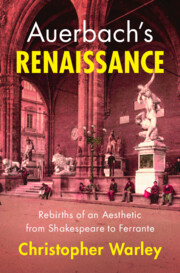
- Publisher:
- Cambridge University Press
- Online publication date:
- April 2025
- Print publication year:
- 2025
- Online ISBN:
- 9781009545457

Erich Auerbach's Mimesis is among the most admired works of literary criticism of the last hundred years. Amidst the horrors of the Second World War, Auerbach's prodigious learning managed – almost miraculously – to give voice to a delicate, subtle optimism. Focusing on Auerbach's account of Renaissance literature, Christopher Warley rediscovers the powerful beauty of Mimesis and shows its vitality for contemporary literary criticism. Analysing Auerbach's account of Renaissance love lyric alongside Woolf's To the Lighthouse, fifteenth-century Burgundian writing alongside Ferrante, and Shakespeare alongside Michelet, Ruskin and Burckhardt, Auerbach's Renaissance traces an aesthetic that celebrates the diversity of human life. Simultaneously it locates in Auerbach's reading of Renaissance writing a challenge to the pessimism of today, the sense that we live in an endless present where the future looms only as a threat. Auerbach's scholarship, the art he learns from Dante, Rabelais, Montaigne, and Shakespeare, is a Renaissance offering democratic possibility.
‘An exciting development in Renaissance studies today is a return to theory that brings literature into the foreground as open possibility. Christopher Warley's brilliant book on Shakespeare and the most famous innovator in postwar literary theory, Erich Auerbach, leads the field for new possibilities in Renaissance studies.’
Gordon Teskey - Francis Lee Higginson Professor of English Literature, Harvard University
‘More than forty years into our latest attempt to reconcile history and art, Chris Warley comes to say they are one and the same. Auerbach is his muse, and there is a brilliant reading of Mimesis here, but the glory of this book is Warley's own eloquent commitment to the emancipations of an aesthetic historism.’
Jeff Dolven - Professor of English, Princeton University
‘Forty years of relentlessly downbeat readings of the Renaissance have found in it the origins of ‘the catastrophic trauma of modernity.’ In Auerbach's Renaissance, Warley proposes resetting the clock by inviting Mimesis and its author's championing of a democratizing, indeed, Rancièrian mixed style into the conversation as a way to rebirth the study of both the period and literary criticism writ large.’
Jane O. Newman - Professor of Comparative Literature, University of California, Irvine
‘With impressive erudition, Christopher Warley engages the idea of renaissance, the Renaissance of early modern Europe as well as the broader motif of rebirth and renewal in modern culture. Placing at its center Erich Auerbach's numerous reflections on writers of the Renaissance, he calls for renewed focus on the historicality of human experience. A fine work of literary criticism in the tradition of Auerbach himself.’
Aamir R. Mufti - O'Connor Professor of English, Johns Hopkins University
‘Warley contributes to the growing body of scholarship on Auerbach, highlighting the enduring relevance of Renaissance criticism to the humanities. His analysis reveals how Mimesis ‘viscerally grapples with catastrophe’, interpreting the seminal book as the author's attempt to articulate a democratic vision through literary criticism.’
Kader Konuk - Professor of German literature, Technische Universität Dortmund
 Loading metrics...
Loading metrics...
* Views captured on Cambridge Core between #date#. This data will be updated every 24 hours.
Usage data cannot currently be displayed.